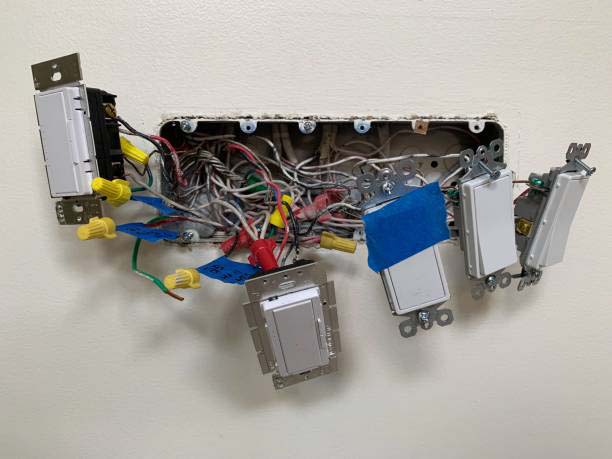

Home Rewiring in Olympia, Washington
When does your home need to be rewired? If you live in Dupont, Yelm, Rochester, Centralia, Lacey, Shelton, or Tumwater, Washington and your house is more than 50 years old it may be a smart investment to rewire your home. But, what are the signs that you may need a rewire? And, can your local electrician get it done? If you google "electricians near me”, not every electrician is experienced in rewires or older homes and may not accept rewire jobs. Our company has completed countless whole house rewires and we know what to do and what signs to look for to assure you if a rewire is necessary or not. Here are some indicators:
1. Knob and Tube or Ungrounded Wire
The most obvious red flag that is a definite sign you'll need a rewire is old knob and tube wire. Knob and tube is hazardous for many reasons. The first reason is that the wire is guaranteed to be 100+ years old: this means that the insulation on the wire and the wire itself have been under stress with heating and cooling cycles causing severe degradation. In addition, the insulation that was used at this time was a type of cloth, meaning that it will be easy to ignite if it gets too hot or the wire sparks: this is why it is illegal to cover knob and tube wire with insulation in your attic or crawlspace. The third reason; back when houses were wired with knob and tube, the electricians didn't have any knowledge of dividing circuits so oftentimes in a knob and tube house half of a 1000sq/ft house will be powered by one fuse or breaker: this is a problem because it means the wire is being put under more stress and modern appliances typically require more power than they used to so both of those factors together mean a higher chance for the wire to fail or get too hot. The last reason you'd want to remove the knob and tube or other wire is the fact that this wiring doesn't have a ground. For more information on what a ground is and why it's important we discuss it in another article on our website.
"We were ready to panic when we learned that our 93-year-old house still had much of its original knob-and-tube wiring, along with "newer" wiring from a few different decades. We didn't know any local electricians and were afraid the process of having the entire house rewired would be a costly ordeal that would take weeks. But from the moment Darrell from Shocking Difference stopped by to give us a bid, we began to relax. He obviously knew his trade and gave us options we didn't know we had. We ended up vacating the house for only four days, then moving back in when everything was finished. Darrell made sure we were thrilled with the job, stopping by twice afterward to check that there were no issues whatsoever. Throughout the process, Shocking Difference treated us like real people, and we can't thank Darrell and his crew enough for doing a quick, perfect job at a reasonable price. Shocking Difference gets the absolute highest recommendation we can possibly give."
2. Stressed/ Old Wire
Any wiring that is over 40 years old has had its integrity diminished through time. The signs you may be able to see that your house is telling you your wiring may be in bad condition are: lights flickering, losing power with it to return inexplicably, permanent power loss in an area. There are some different causes for those power issues to occur but if you start to notice any of them it would be a good idea to get an electrician out to take a look. An electrician will be able to inspect some of the wirings to check the condition. Wiring over 40 years old often becomes brittle which can be the cause of
some issues. The brittleness also makes it much harder for an electrician to work with as the wire will break easily and isn't as malleable as younger wire. The lifespan of wires can vary depending on how often a circuit is used, how much power is drawn from the circuit, the method an installer used when originally installing plugs and switches, and the ambient temperature around the wire. The general rule of thumb recommendation for a life span is 40-70 years old.
3. Wiring Errors
Depending on how long you've owned your home and what workers you've had in it, there are some do-it-yourself alterations/ installs that are illegal and unsafe. I've witnessed on more than one occasion a home that appears to have been updated within the past 10 years or so, but it's nothing more than a pig wearing lipstick. It's a shame some "electricians" are willing to put their name on work like this. If you are not sure of the history of your home or if you had a well-done install, it would be worth your time to get another electrician's opinion on the work. I have been to many homes where power is lost to one or multiple areas of the home and there was no way to find the issue without stripping the walls down to the studs. So the only option to solve an issue like this is a rewire. If you're not sure of the work that's been done on your home, you can check your electrical panel cover for inspection stickers.
4. Modern Protection
The last reason to get your home rewired is that every home ought to have the same level of protection. What does that mean? New houses being built are required to have circuit breakers with added protection. Instead of standard breakers, new houses are being built with AFCI and GFCI protection. These breakers will trip if the circuit is overloaded, same as a standard breaker, and in addition, AFCI breakers trip at the sign of a spark and wire damage, and GFCI breakers protect against electrocution. In many cases, older homes are not compatible with these breakers because the wire is already in too bad of condition. So a rewire is the best way to protect your home at the 2020 standard. In addition, since an electrician is required to install AFCI/GFCI protection almost any time they alter a circuit, it is more difficult to get legal work done on an older wired home.
CONTACT INFORMATION
Email: info@shocking-difference.com
Phone number: (360) 754-4542
PAYMENT OPTIONS




BROWSE OUR WEBSITE
CONTACT INFORMATION
Address :
5329 Lemon Rd Ne, Olympia, WA 98506
Email :
info@shocking-difference.com
Phone number :
(360) 754-4542




